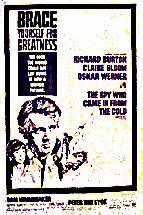 :
Study
Questions: Week Ten
:
Study
Questions: Week Ten :
Study
Questions: Week Ten
:
Study
Questions: Week Ten
Berlin: Cold War Epicenter
The Spy Who Came in from the Cold (1965), Funeral in Berlin (1966), and One, Two, Three (1961).
The city of Berlin was widely recognized as the geographical center of the Cold War in Europe. Beginning with The Big Lift in 1949 and continuing through the 1960s, Berlin served as the setting for films dramatizing the espionage battles between East and West. By the mid-1960s attitudes toward the Cold War had begun to change as threat of nuclear annihilation, an increasing disenchantment with militant anti-communism, and the promise of détente between The United States and the Soviet Union made the threat of War seem both unthinkable and absurd. These ideological shifts in American culture are evident in the selection of Berlin films for this week. The Spy Who Came in from the Cold (1965) portrays espionage operations as an essentially amoral struggle in which neither East not West can claim moral superiority and both seem indifferent to the fate of their agents. Funeral in Berlin (1966) strips the espionage narrative of its serious ideological meanings, turning espionage into a glamorous activity (n the manner of James Bond films). And the final film, One, Two, Three (1961) satirizes cold war conflicts.
1. In what ways are the opening sequences of The Spy Who Came in from the Cold and Funeral in Berlin similar? Consider the shots of the Wall, the Berlin landmarks, the planned escape. How do they set the mood for the action to come?
2. How does the contrast between the two escapes characterize the attitude toward the Cold War in each film? What specific details shaped your opinion?
3. How do the contrasts between the visual images of East and West Berlin make a comment on the relative merits of capitalism and communism in Funeral? Conversely, how do the similarities of the two sides in The Spy suggest a basic moral similarity between the opposing economic systems?
4. In what ways do the ways in which the central characters are introduced (where they are seen, what they are doing, how they regard themselves) foreshadow the contrasting themes of the films?
5. In what ways are Ross (Funeral) and Control (The Spy) similar in character?
6. What is the status of women in these films? Are they similar? Why? Why not?
7. Describe the similarities in the plot structure of these two films. Consider the heroes' assignments, their relations with their superiors, the duplicitous nature of the enemy, the conclusions.
8. What makes Funeral more ironic and lighthearted than The Spy? Consider the cinematic style, the personalities of the characters, the conclusion.
9. Why is a Coke executive equated with government espionage agents in One, Two, Three?
10. How does serve to champion the power of consumerism over political ideology?
11. What is the thematic significance of the conversion of the communist student to capitalism?
12. In what ways might Wilder's film seen as prophetic in suggesting that material prosperity is a force stronger than political ideologies?
13. How does One, Two, Three manage to make the Cold War seem trivial?